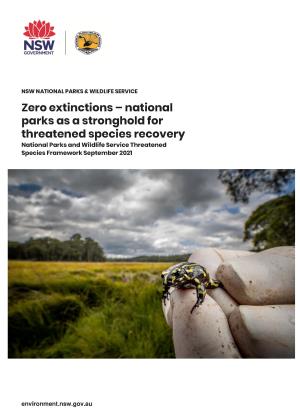Around 84% of all threatened species in New South Wales are represented on the national park estate, despite national parks occupying less than 10% of the state. The concentration of threatened species and their habitats highlights the critical role of national parks in the effective conservation of threatened species.
However, there is evidence that the overall decline in biodiversity in New South Wales is occurring even in the national park estate. Key threats affecting threatened species populations in national parks include feral predators and other feral animals, invasive weeds, changed fire regimes and a range of impacts associated with climate change.
The Zero extinctions – national parks as a stronghold for threatened species recovery: National Parks and Wildlife Service Threatened Species Framework (the Threatened Species Framework) outlines a series of actions designed to secure and restore threatened species populations in national parks. We have several objectives for threatened species conservation in NSW national parks.
Our commitments
By 30 June 2026:
- Stabilise or improve the on-park trajectory of at least 300 threatened species (measured by reference to metrics appropriate to the relevant species).
- No extinctions on the national park estate (that is, no loss of threatened species from the national park estate as a whole).
By 30 June 2030:
- Stabilise or improve the on-park trajectory of all threatened species.
- No extinctions on the national park estate.
- Remove # species (target to be determined by 30 June 2026) from the threatened species list as a result of on-park conservation measures.
Our actions
Measures being implemented to protect threatened species in national parks include:
- the declaration of important threatened species habitat as Assets of Intergenerational Significance
- acquisition of key threatened species habitat for addition to the national park estate
- the establishment of a network of feral predator-free areas to support the return of more than 25 locally extinct species
- delivery of the largest feral animal control program in national park history
- establishment of a dedicated ecological risk unit to ensure threatened species are considered in new fire plans
- rolling out a world-class ecological health framework across national parks.
Reporting on our objectives
NPWS has released its first threatened species annual report and threatened species status report. This is an important first step in ensuring we are on track to meet our commitments under the NPWS Threatened Species Framework, which commits NPWS to zero extinctions and to stabilise and improve the trajectory of all threatened species on national parks by June 2030. You can read the reports here:
Threatened Species Framework annual report 2021–22 and 2022–23


